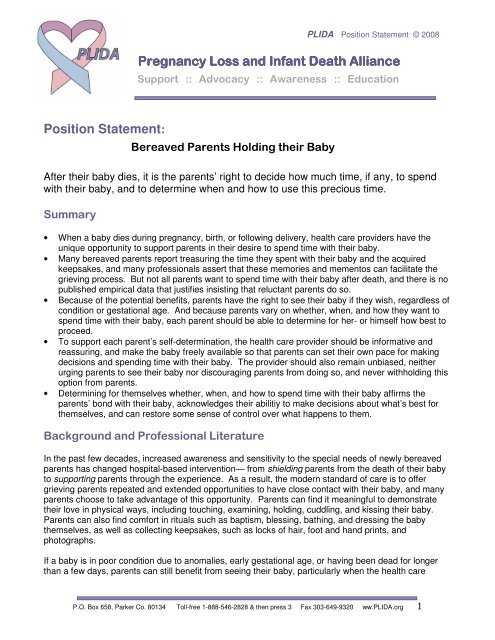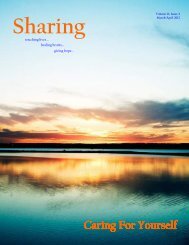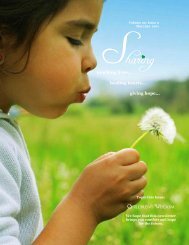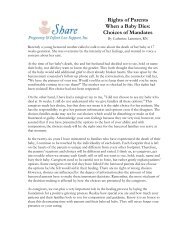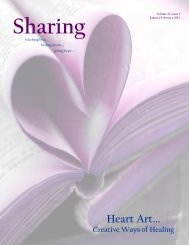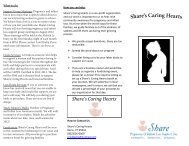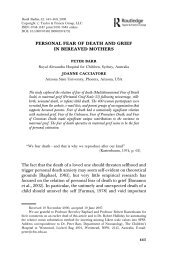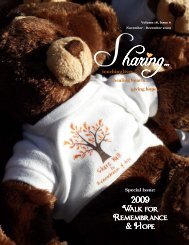PLIDA- Statement on holding baby - Share Pregnancy & Infant Loss ...
PLIDA- Statement on holding baby - Share Pregnancy & Infant Loss ...
PLIDA- Statement on holding baby - Share Pregnancy & Infant Loss ...
Create successful ePaper yourself
Turn your PDF publications into a flip-book with our unique Google optimized e-Paper software.
<str<strong>on</strong>g>PLIDA</str<strong>on</strong>g> Positi<strong>on</strong> <str<strong>on</strong>g>Statement</str<strong>on</strong>g> © 2008<br />
<br />
<br />
! <br />
Positi<strong>on</strong> <str<strong>on</strong>g>Statement</str<strong>on</strong>g>:<br />
<br />
After their <strong>baby</strong> dies, it is the parents’ right to decide how much time, if any, to spend<br />
with their <strong>baby</strong>, and to determine when and how to use this precious time.<br />
<br />
• When a <strong>baby</strong> dies during pregnancy, birth, or following delivery, health care providers have the<br />
unique opportunity to support parents in their desire to spend time with their <strong>baby</strong>.<br />
• Many bereaved parents report treasuring the time they spent with their <strong>baby</strong> and the acquired<br />
keepsakes, and many professi<strong>on</strong>als assert that these memories and mementos can facilitate the<br />
grieving process. But not all parents want to spend time with their <strong>baby</strong> after death, and there is no<br />
published empirical data that justifies insisting that reluctant parents do so.<br />
• Because of the potential benefits, parents have the right to see their <strong>baby</strong> if they wish, regardless of<br />
c<strong>on</strong>diti<strong>on</strong> or gestati<strong>on</strong>al age. And because parents vary <strong>on</strong> whether, when, and how they want to<br />
spend time with their <strong>baby</strong>, each parent should be able to determine for her- or himself how best to<br />
proceed.<br />
• To support each parent’s self-determinati<strong>on</strong>, the health care provider should be informative and<br />
reassuring, and make the <strong>baby</strong> freely available so that parents can set their own pace for making<br />
decisi<strong>on</strong>s and spending time with their <strong>baby</strong>. The provider should also remain unbiased, neither<br />
urging parents to see their <strong>baby</strong> nor discouraging parents from doing so, and never with<strong>holding</strong> this<br />
opti<strong>on</strong> from parents.<br />
• Determining for themselves whether, when, and how to spend time with their <strong>baby</strong> affirms the<br />
parents’ b<strong>on</strong>d with their <strong>baby</strong>, acknowledges their abilitiy to make decisi<strong>on</strong>s about what’s best for<br />
themselves, and can restore some sense of c<strong>on</strong>trol over what happens to them.<br />
<br />
In the past few decades, increased awareness and sensitivity to the special needs of newly bereaved<br />
parents has changed hospital-based interventi<strong>on</strong>— from shielding parents from the death of their <strong>baby</strong><br />
to supporting parents through the experience. As a result, the modern standard of care is to offer<br />
grieving parents repeated and extended opportunities to have close c<strong>on</strong>tact with their <strong>baby</strong>, and many<br />
parents choose to take advantage of this opportunity. Parents can find it meaningful to dem<strong>on</strong>strate<br />
their love in physical ways, including touching, examining, <strong>holding</strong>, cuddling, and kissing their <strong>baby</strong>.<br />
Parents can also find comfort in rituals such as baptism, blessing, bathing, and dressing the <strong>baby</strong><br />
themselves, as well as collecting keepsakes, such as locks of hair, foot and hand prints, and<br />
photographs.<br />
If a <strong>baby</strong> is in poor c<strong>on</strong>diti<strong>on</strong> due to anomalies, early gestati<strong>on</strong>al age, or having been dead for l<strong>on</strong>ger<br />
than a few days, parents can still benefit from seeing their <strong>baby</strong>, particularly when the health care<br />
P.O. Box 658, Parker Co. 80134 Toll-free 1-888-546-2828 & then press 3 Fax 303-649-9320 ww.<str<strong>on</strong>g>PLIDA</str<strong>on</strong>g>.org
<str<strong>on</strong>g>PLIDA</str<strong>on</strong>g> Positi<strong>on</strong> <str<strong>on</strong>g>Statement</str<strong>on</strong>g> © 2008<br />
provider can openly and h<strong>on</strong>estly describe the normal and beautiful parts of their <strong>baby</strong>’s body, and then<br />
explain any anomalies or deteriorati<strong>on</strong>. Even when their <strong>baby</strong> is undeveloped, deformed, or<br />
deteriorated, parents tend to focus <strong>on</strong> the special beauty in their <strong>baby</strong>, looking through the eyes of love<br />
and seeing past what others may find difficult to view.<br />
Many bereaved parents report that close c<strong>on</strong>tact with their <strong>baby</strong> is an invaluable experience.<br />
Particularly when access to their <strong>baby</strong> is limited to pregnancy and then curtailed too so<strong>on</strong> by death,<br />
c<strong>on</strong>tact offers parents their <strong>on</strong>ly chance to meet this child face-to-face. C<strong>on</strong>tact allows the parents to<br />
transform their b<strong>on</strong>d from the unseen but loved <strong>baby</strong> in the womb to the visible and held child in their<br />
arms, and to establish the particular identity of this child in the family, including who he or she looked<br />
like. Spending time with their <strong>baby</strong> in ways that hold meaning for them can help parents feel c<strong>on</strong>nected<br />
to their child, and loving c<strong>on</strong>tact with their <strong>baby</strong> can meet an intense spiritual need.<br />
Parents also report that these experiences can help them acquire positive memories and comforting<br />
mementos of their <strong>baby</strong>’s life. These memories and mementos also serve to affirm their <strong>baby</strong>’s<br />
existence and can help parents process and feel validated in their grief. These final experiences and<br />
moments with the <strong>baby</strong> might also be shared with family and friends, building a community around the<br />
<strong>baby</strong>’s memory, and can be shared post-discharge with other grieving families with whom it might be<br />
beneficial for the family to interact. Rather than feeling al<strong>on</strong>e, abnormal, or “crazy” for being so bereft,<br />
parents can feel acknowledged and comforted.<br />
Not all parents want c<strong>on</strong>tact with their <strong>baby</strong> after death, and there is no published empirical data that<br />
justifies insisting these parents do so. But when parents do want c<strong>on</strong>tact, they must be able to spend<br />
sufficient time with their <strong>baby</strong>, <strong>on</strong> their own terms, or they may feel burdened with regret and thwarted<br />
in their desire to dem<strong>on</strong>strate their tender loving care. This missed opportunity is yet another loss to<br />
endure.<br />
Because parents vary <strong>on</strong> whether, when, and how they want to spend time with their <strong>baby</strong>, they must<br />
be supported in making their own decisi<strong>on</strong>s and doing what they believe is best. Health care providers<br />
have a resp<strong>on</strong>sibility to inform parents of the opti<strong>on</strong> to see their <strong>baby</strong> and the possibilities for how to<br />
spend that time, and to offer reassurances for their c<strong>on</strong>cerns. The <strong>baby</strong> should remain freely available<br />
to the parents as most are in shock, and require time and support to explore this opportunity. Even for<br />
parents who decline at first, knowing that their <strong>baby</strong> c<strong>on</strong>tinues to be available gives them the freedom<br />
to rec<strong>on</strong>sider their opti<strong>on</strong>s.<br />
For parents, determining how to spend time with their <strong>baby</strong> affirms their parental b<strong>on</strong>d and<br />
acknowledges their abilitiy to decide what’s best for themselves. Being in charge of whether or when to<br />
spend time with their <strong>baby</strong> can also restore some sense of c<strong>on</strong>trol over what happens to them even as<br />
they face the trauma of their <strong>baby</strong>’s death. Health care providers must remain unbiased, supporting<br />
parents in whatever they choose to do.<br />
For more informati<strong>on</strong>, guidance, and support around implementati<strong>on</strong>, please refer to<br />
both the <str<strong>on</strong>g>PLIDA</str<strong>on</strong>g> Positi<strong>on</strong> <str<strong>on</strong>g>Statement</str<strong>on</strong>g> and <str<strong>on</strong>g>PLIDA</str<strong>on</strong>g> Practice Guidelines <strong>on</strong><br />
Offering the Baby to Bereaved Parents.<br />
This positi<strong>on</strong> statement was approved June 26, 2008 by the Board of Directors of <str<strong>on</strong>g>PLIDA</str<strong>on</strong>g>, the<br />
<strong>Pregnancy</strong> <strong>Loss</strong> and <strong>Infant</strong> Death Alliance. <str<strong>on</strong>g>PLIDA</str<strong>on</strong>g> is solely resp<strong>on</strong>sible for the c<strong>on</strong>tent.<br />
P.O. Box 658, Parker Co. 80134 Toll-free 1-888-546-2828 & then press 3 Fax 303-649-9320 ww.<str<strong>on</strong>g>PLIDA</str<strong>on</strong>g>.org
<str<strong>on</strong>g>PLIDA</str<strong>on</strong>g> Positi<strong>on</strong> <str<strong>on</strong>g>Statement</str<strong>on</strong>g> © 2008<br />
<br />
" <br />
Armstr<strong>on</strong>g DS. Perinatal loss and parental distress after the birth of a healthy infant. Adv Ne<strong>on</strong>atal<br />
Care. 2007 Aug;7(4):200-6.<br />
Barnsteiner JH, Gillis-D<strong>on</strong>ovan J. Being related and separate: A standard for therapeutic relati<strong>on</strong>ships.<br />
Maternal Child Nursing Journal. 1990;15(4):223-4;226-8.<br />
Capitulo KL. Evidence for healing interventi<strong>on</strong>s with perinatal bereavement. MCN Am J Matern Child<br />
Nurs. 2005 Nov-Dec;30(6):389-96.<br />
Carls<strong>on</strong> R, Weber-Dennigmann K. Lammert C. Sharing and Caring: Establishing and Maintaining an<br />
Effective <strong>Share</strong> Program. St. Charles, Missouri: <strong>Share</strong> <strong>Pregnancy</strong> and <strong>Infant</strong> <strong>Loss</strong> Support, Inc., 2007.<br />
Davis DL, Stewart M, Harm<strong>on</strong> RJ. Perinatal loss: providing emoti<strong>on</strong>al support for bereaved parents.<br />
Birth. 1988 Dec;15(4):242-6.<br />
Davis DL. Empty Cradle, Broken Heart: Surviving the Death of Your Baby. Rev. ed. Golden, CO:<br />
Fulcrum, 1996.<br />
Gold, KJ. Navigating care after a <strong>baby</strong> dies: a systematic review of parent experiences with health<br />
providers. J Perinatol. 2007 Apr;27(4):230-7.<br />
Gold K, Dalt<strong>on</strong> V, Schwenk T. Hospital care for parents after perinatal death. Obstet Gynecol.<br />
2007;109(5):1156-1166.<br />
Hughes P, Turt<strong>on</strong> P, Hopper E, Evans CD. Assessment of guidelines for good practice in psychosocial<br />
care of mothers after stillbirth: a cohort study. Lancet. 2002 Jul 13;360(9327):114-8.<br />
Hughes P, Riches S. Psychological aspects of perinatal loss. Cur Opin Obstet Gynecol. 2003;15:107-<br />
111.<br />
Kavanaugh K, Hershberger P. Perinatal loss in low-income African American parents.<br />
J Obstet Gynecol Ne<strong>on</strong>atal Nurs. 2005 Sep-Oct;34(5):595-605.<br />
Kavanaugh K, Moro T. Supporting parents after stillbirth or newborn death: There is much that nurses<br />
can do. Am J Nurs. 2006 Sep;106(9):74-9.<br />
Kobler K, Limbo R, Kavanaugh K. Meaningful moments: The use of ritual in pediatric and perinatal<br />
death. MCN Am J Matern Child Nurs. 2007 Sept-Oct;32(5):288-96.<br />
Koloroutis M. (Ed.) Relati<strong>on</strong>ship-Based Care: A Model for Transforming Practice. Minneapolis, MN:<br />
Creative Health Care Management, 2004.<br />
Le<strong>on</strong> IG. Providing versus packaging support for bereaved parents after perinatal loss. Birth. 1992<br />
Jun;19(2):89-91.<br />
Le<strong>on</strong> IG. Perinatal loss. A critique of current hospital practices. Clin Pediatr (Phila). 1992<br />
Jun;31(6):366-74.<br />
P.O. Box 658, Parker Co. 80134 Toll-free 1-888-546-2828 & then press 3 Fax 303-649-9320 ww.<str<strong>on</strong>g>PLIDA</str<strong>on</strong>g>.org
<str<strong>on</strong>g>PLIDA</str<strong>on</strong>g> Positi<strong>on</strong> <str<strong>on</strong>g>Statement</str<strong>on</strong>g> © 2008<br />
Le<strong>on</strong> IG. When a Baby Dies: Psychotherapy for <strong>Pregnancy</strong> and Newborn <strong>Loss</strong>. New Haven, CT: Yale<br />
University Press, 1992.<br />
Limbo RK, Wheeler SR. When a Baby Dies: A Handbook for Healing and Helping. Rev ed. LaCrosse,<br />
Wisc: Gundersen Lutheran Medical Foundati<strong>on</strong>, Inc., 1998.<br />
Meert KL, Thurst<strong>on</strong> CS, Briller SH. The spiritual needs of parents at the time of their child's death in the<br />
pediatric intensive care unit and during bereavement: a qualitative study. Pediatr Crit Care Med. 2005<br />
Jul;6(4):420-7.<br />
Saflund K, Sjogren B, Wredling R. The role of caregivers after a stillbirth: views and experiences of<br />
parents. Birth. 2004 Jun;31(2):132-7.<br />
<strong>Share</strong> <strong>Pregnancy</strong> and <strong>Infant</strong> <strong>Loss</strong> Support, Inc. Rights of Parents When a Baby Dies; Rights of the<br />
Baby. Adapted with permissi<strong>on</strong> from Women’s College Hospital, Perinatal Bereavement Team,<br />
Tor<strong>on</strong>to Ontario Canada. 1991; 2006.<br />
Swans<strong>on</strong>, KM. Nursing as informed caring for the well-being of others. Image J Nurs Sch. 1993;25(4):<br />
352-7.<br />
Walling, AD. Tips from other journals: Should mothers see their infants after stillbirth? Amer Fam Phys.<br />
2002 Nov 15: http://www.aafp.org/afp/20021115/tips/17.html<br />
Workman E. Guiding parents through the death of their infant. J Obstet Gynecol Ne<strong>on</strong>atal Nurs. 2001<br />
Nov-Dec;30(6):569-73.<br />
P.O. Box 658, Parker Co. 80134 Toll-free 1-888-546-2828 & then press 3 Fax 303-649-9320 ww.<str<strong>on</strong>g>PLIDA</str<strong>on</strong>g>.org
<str<strong>on</strong>g>PLIDA</str<strong>on</strong>g> Positi<strong>on</strong> <str<strong>on</strong>g>Statement</str<strong>on</strong>g> © 2008<br />
# <br />
Kathy Adzich, BA<br />
Founder, Jakob’s Room Project<br />
www.trustingthejourney.com<br />
Deborah L. Davis, PhD<br />
Developmental Psychologist and Writer<br />
Denver, Colorado<br />
Todd Hochberg, BA<br />
Bereavement Photographer,<br />
Touching Souls Photography<br />
www.touchingsouls.org<br />
Chicago, Illinois<br />
Karen Kavanaugh, RN, PhD, FAAN<br />
Professor, Dept. of Women, Children, and Family Health Science<br />
University of Illinois at Chicago<br />
Chicago, Illinois<br />
Kathie Kobler, MS, RN<br />
Bereavement Coordinator for Women and Children's Services<br />
Coordinator of KAYLA's Hope Program<br />
Advocate Lutheran General Hospital<br />
Park Ridge, Illinois<br />
Catherine A. Lammert, RN<br />
Executive Director<br />
SHARE <strong>Pregnancy</strong> and <strong>Infant</strong> <strong>Loss</strong> Support, Inc.<br />
St. Charles, Missouri<br />
Irving Le<strong>on</strong>, PhD<br />
Clinical Psychologist<br />
Adjunct Associate Professor of Obstetrics and Gynecology<br />
University of Michigan Health System<br />
Ann Arbor, Michigan<br />
Rana Limbo, PhD, RN, CNS-BC<br />
Director of Bereavement and Advance Care Planning Services<br />
Faculty Associate, University of Wisc<strong>on</strong>sin-Madis<strong>on</strong> School of Nursing<br />
Gundersen Lutheran Medical Foundati<strong>on</strong>, Inc.<br />
La Crosse, Wisc<strong>on</strong>sin<br />
Darryl Owens, MDiv, BCC, CT<br />
Women’s Services Chaplain/Grief Counselor,<br />
Clinical Chaplain II at the University of North Carolina Hospitals<br />
Chapel Hill, North Carolina<br />
Janet N. Press, RNC, BSN, CT<br />
Perinatal Bereavement Services Coordinator, Crouse Hospital<br />
Syracuse, New York<br />
<br />
Nicole Alst<strong>on</strong>, BS<br />
Founder and Executive Director<br />
The Skye Foundati<strong>on</strong><br />
Trent<strong>on</strong>, NJ<br />
Shirley Bulen, RN, BSN<br />
Retired, Labor & Delivery nurse at St. Mary's Medical Center<br />
Developer, coordinator, support group facilitator of the<br />
perinatal loss program at SMMC<br />
Blue Springs, MO<br />
Dorotha Cicchinelli, BASW, LCCE, CBC, MNM<br />
Social worker and childbirth educator in private practice.<br />
Founder and Executive Director<br />
Colorado <strong>Pregnancy</strong> & Newborn <strong>Loss</strong><br />
Parker, CO<br />
MaryBeth Cooper, MAR, BCC<br />
Director of Perinatal Bereavement Program for TriHealth<br />
Hospitals System<br />
Board Certified Chaplain, NACC<br />
Cincinnati, Ohio<br />
Mad<strong>on</strong>na Daley, MS, RN<br />
Educator for Bereavement Services of La Crosse, WI<br />
Onalaska, WI<br />
Deborah L. Davis, PhD<br />
Developmental psychologist and writer;<br />
Author of Empty Cradle, Broken Heart; Loving and Letting Go<br />
Denver, CO<br />
Joann O’Leary, PhD, MPH, MS<br />
Parent-<strong>Infant</strong> Specialist and adjunct faculty member<br />
School of Nursing, University of MN<br />
Author of When <strong>Pregnancy</strong> Follows a <strong>Loss</strong><br />
Minneapolis, MN<br />
Sarah Kye Price, PhD, MSW<br />
Social work educator and maternal & child health researcher<br />
Assistant Professor of Social Work<br />
Virginia Comm<strong>on</strong>wealth University<br />
Richm<strong>on</strong>d, VA<br />
Alana Roush, RNC<br />
Former Director of bereavement program for Trihealth<br />
Member of the Bereavement Services/RTS Nati<strong>on</strong>al Faculty<br />
Cincinnati, OH<br />
Beth Seyda, BS<br />
Advocate, educator, researcher for pediatric end-of-life care<br />
Co-Founder and Executive Director<br />
Compassi<strong>on</strong>ate Passages, Inc.<br />
Chapel Hill, NC<br />
P.O. Box 658, Parker Co. 80134 Toll-free 1-888-546-2828 & then press 3 Fax 303-649-9320 ww.<str<strong>on</strong>g>PLIDA</str<strong>on</strong>g>.org


